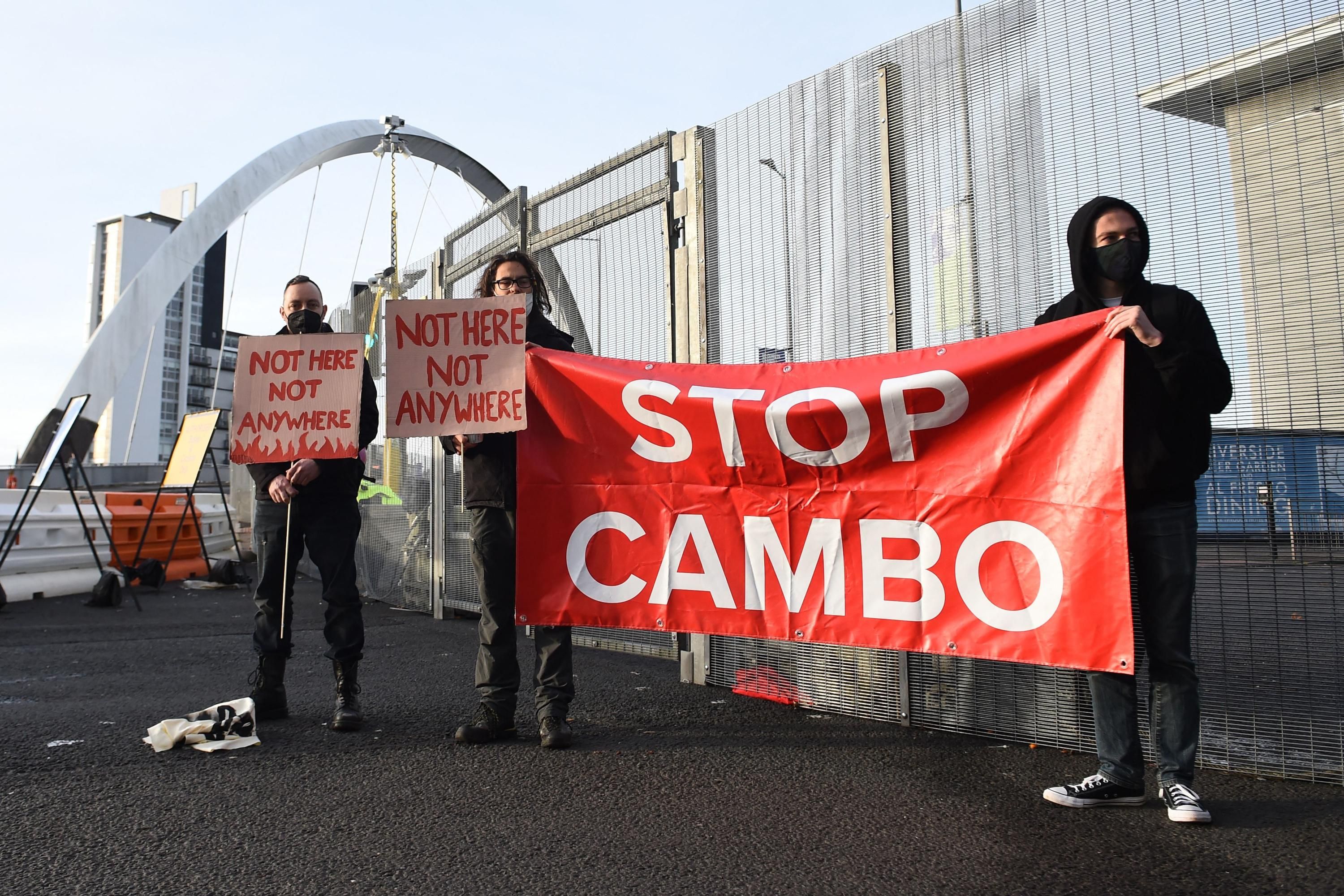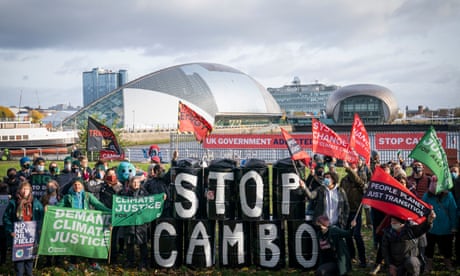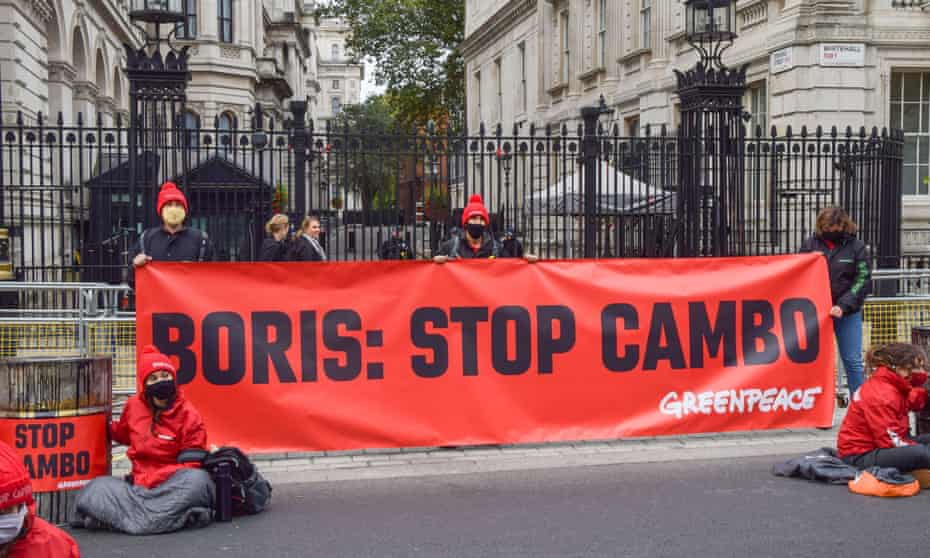
By Marthe de Ferrer & Agencies • Updated: 03/12/2021 - 15:46
Royal Dutch Shell has pulled out of a controversial oil project near Scotland’s Shetland Islands, saying the project no longer makes economic sense for the company.
The company said on Thursday it had scrapped plans to develop the Cambo North Sea oilfield, which became a lightning rod for climate activists seeking to halt Britain's development of new oil and gas resources.
Following a "comprehensive screening" of the Cambo field, Shell "concluded the economic case for investment in this project is not strong enough at this time, as well as having the potential for delays," the company said in a statement.
Shell had a 30 per cent stake in the Cambo project, which is opposed by environmental groups who say Britain should stop developing new oil and gas fields as part of its efforts to combat global warming.
"This is a small step in the right direction in the fight against fossil fuels," says Scottish environmental scientist and campaigner Mara. "Cambo is wholly unnecessary and it's unacceptable that the government are still considering allowing it to continue.
"How can the UK host COP26 and claim to be a green leader, while facilitating projects like this? We know from the IPCC report that extraction simply has to stop. It's a positive move that Shell has withdrawn though, and shows the power of public pressure and grassroots activism."
Shell plans underwater explosions during peak whale mating season
Local activists in long battle to stop oil drilling on Isle of Wight
Cambo oil field and Cumbria coal mine should not be approved if UK is to have credibility at COP26
Still plans for Cambo to move ahead
Private equity-backed Siccar Point, which owns the remaining 70 per cent of the field, confirmed in a separate statement that "Shell has taken the decision to not progress its investment at this stage."
The Cambo project off the Shetland Isles has been at the centre of a political debate on whether Britain should develop new fossil fuel resources as it seeks to sharply reduce its greenhouse gas emissions in the coming decades.
"Cambo remains critical to the UK's energy security and economy," Siccar Point Chief Executive Officer Jonathan Roger said in a statement.
"Whilst we are disappointed at Shell’s change of position ... we will continue to engage with the UK Government and wider stakeholders on the future development of Cambo," he said.
Roger claims that developing the field 125 kilometres west of the Shetland Islands will create 1,000 jobs and help ease the UK’s transition to a low-carbon economy. However, activists and climate scientists are fiercely opposed to the development - saying it is directly opposed to the UK's climate goals.
Scottish First Minister Nicola Sturgeon has urged the UK government to scrap the project since August when she made her first statement on the controversy.
"I am asking that the UK government agrees to reassess licences already issued but where field development has not yet commenced. That would include the proposed Cambo development," she said at the time.
"Such licences, some of them issued many years ago, should be reassessed in light of the severity of the climate emergency we now face, and against a compatibility checkpoint that is fully aligned with our climate change targets and obligations."
Additional sources • REUTERS, AFP, AP
This Could Mean The End To Cambo Oil Field Development
Shell announced on Thursday that it would no longer proceed with its investment in the Cambo oil field.
Shell had a 30% stake in the Cambo oilfield, in the UK’s North Sea, with Siccar Point Energy holding the remaining 70% stake.
Siccar expressed its disappointment in Shell’s exit, and said it would need to review its options for Cambo.
For Shell, the reason to exit the project was the potential for delay as well as a lack of strength of economics.
Cambo was estimated to be capable of producing 175 million barrels of oil in its first phase. Cambo has drawn the attention of environmental groups protesting its development.
“After comprehensive screening of the proposed Cambo development, we have concluded the economic case for investment in this project is not strong enough at this time, as well as having the potential for delays,” a Shell spokesman said on Thrusday.
Nevertheless, Shell said that continued investment in the UK oil and gas sector “remains critical to the country’s energy security”, stressing that it still believes in the UK North Sea.
Anti-Cambo development campaigners have hailed Shell’s move as the “beginning of the end for all new oil and gas projects,” one such campaigner from Friends of the Earth Scotland said.
Oil and Gas regulator OGUK warned that the UK would still rely on new oil and gas projects.
“This is a commercial decision between partners but doesn’t change the facts that the UK will continue to need new oil and gas projects if we are to protect security of supply, avoid increasing reliance on imports and support jobs,” Jenny Stanning, external relations director at OGUK said.
By Julianne Geiger for Oilprice.com
'Protest Works': Cheers as Shell Signals Pullout of Cambo Oil Field Project
"We have to see the end of North Sea projects as well as all new fossil fuel extraction: There is no future in them."

Activists protest against the Cambo oil field project in the Shetland Islands in Glasgow, Scotland on November 11, 2021. (Photo: Andy Buchanan/AFP via Getty Images)
JULIA CONLEY
Climate campaigners in the United Kingdom applauded Thursday as oil giant Shell signaled it would not drill for oil in the proposed Cambo oil field off the coast of Scotland's Shetland Islands, following a grassroots effort to halt the project.
"Governments and oil and gas companies will—and are—being held accountable by people all over the world who know exactly who is to blame for the climate crisis."
Advocates said Shell's announcement that it had found a weak economic case for the Cambo project should deliver a "deathblow" to the proposal, and demanded the U.K. government end its support for drilling in the oil field, which would lie 78 miles west of the islands in the North Sea.
"With yet another key player turning its back on the scheme the government is cutting an increasingly lonely figure with their continued support for the oil field," Philip Evans, oil campaigner at Greenpeace U.K., told The Guardian.
Climate action group 350.org credited activists who have signed petitions, attended public actions, and pressured policymakers to scrap the project. Last summer, 80,000 people signed a letter that was sent to the U.K. government demanding the Cambo oil field be blocked.
"Protest works!" said 350 Europe.
Shell's decision to pull out of the project comes weeks after its plans to develop the Jackdaw gas field, also in the North Sea, were rejected by regulators due to the project's expected environmental impact.
The U.K. has committed to reaching net-zero fossil fuel emissions by 2050, a goal that advocates say is incompatible with drilling in the North Sea. The oil field contains over 800 million barrels of oil, the extraction of which would have a climate impact equivalent to 10 times Scotland's annual emissions.
Shell Oil would have controlled 30% of the Cambo oil field, with its partner Siccar Point Energy owning 70%. According to Reuters, it was unclear Thursday whether the oil field can be developed without Shell's involvement.
"We have to see the end of North Sea projects as well as all new fossil fuel extraction: There is no future in them," Connor Schwartz of Friends of the Earth told The Guardian. "Carrying on risks more than just balance sheets, it makes the path to 1.5°C even harder."
Tessa Khan, founder and director of climate action group Uplift, called Shell's withdrawal from the project "genuinely huge news" that could spell the end for oil and gas development in the U.K., considering Shell cited economic grounds for its decision.
"Governments and oil and gas companies will—and are—being held accountable by people all over the world who know exactly who is to blame for the climate crisis and the unavoidable implication of all those promises to preserve our climate: We have to keep fossil fuels in the ground," said Khan. "And countries like the U.K.—who are one of the biggest historical emitters of greenhouse gases, who have the resources to shift away from oil and gas, and who owe a huge climate debt to the rest of the world—have to move first."
Our work is licensed under Creative Commons (CC BY-NC-ND 3.0). Feel free to republish and share widely.
Shell U-turn on Cambo could mean end for big North Sea oil projects
Industry sources say Siccar Point will struggle to find new partner to take on Shell’s 30% stake in oilfield
Jillian Ambrose
Fri 3 Dec 2021
Shell’s decision to back out of plans to develop the Cambo oilfield could sound the “death knell” for new large-scale North Sea projects, industry figures say, as the UK’s tougher climate agenda prompts oil companies to retreat from the ageing oil basin.
Sources said Shell’s project partner, the private equity-backed Siccar Point, would struggle to find another partner to take on Shell’s 30% stake in the new oilfield, which has provoked outrage among green campaigners.
Shell’s retreat has cast doubt over the future of a project that could yield hundreds of millions of barrels of oil, and sources say it raises fresh doubts over the North Sea’s future large-scale oil projects too.
“This is a turning point,” said one industry source, who asked not to be named. “Companies will be thinking: if Shell can’t do it, can we? I just don’t see any truly large-scale projects being sanctioned in the North Sea any more. There will still be small developments around existing fields. But this is a death knell for major new projects in the UK.”
The Guardian understands that Shell scrapped the Cambo project after the government made clear it would need to meet certain “climate concessions” to win its approval. The company said publicly that the “economic case for investment” was not strong.
Shell’s withdrawal comes weeks after the company was left disappointed by a UK regulator’s “unexpected” decision to decline its application to develop a separate North Sea project at the Jackdaw field.
“It’s a bit embarrassing for Shell so soon after announcing it would relocate its headquarters to London from the Netherlands,” the source added.
Most big listed oil companies have reduced their presence in the North Sea in recent years by selling off assets, and the companies that remain are relative minnows that would balk at the scale of the Cambo project or lack the experience to develop the field.
“There are no listed oil companies which would look seriously at this project, and the private companies don’t typically have the track record in project development which Shell brought to the table,” said the source.
There was also “a huge amount of uncertainty” around the government’s support for new oil and gas development in the North Sea, according to the source, which could put off smaller companies which require tighter project timelines than larger ones.
Caroline Rance, a campaigner with Friends of the Earth Scotland, said Shell’s exit from the Cambo field “marks the beginning of the end for all new oil and gas projects” in the North Sea.
Green campaigners have called on the government to take a clear stance against new fossil fuel developments after findings from the International Energy Agency, the global energy watchdog, that no new fossil fuel projects are compatible with the world’s climate targets.
“Both the UK and Scottish governments must now officially reject Cambo, say no to any future oil and gas developments in UK waters and get on with planning a fair and fast transition for people working in this industry,” Rance said.

Shell pulls out of Cambo oilfield project
The questions around the North Sea are likely to reignite tensions between the Treasury, which is understood to be concerned over the flight of investment from the UK post-Brexit, and the Department for Business, Energy and Industrial Strategy, which leads the UK’s climate strategy.
Jonathan Roger, the chief executive of Siccar Point, said the company was in consultation with the regulator and stakeholders “on taking Cambo forward and the next steps required to do that”.
He said: “Norway continues to invest in both new oil and gas and renewable developments to deliver a fair and managed transition, but the UK is at risk of damaging its economy and increasing imports with a higher carbon impact if new developments are not brought forward during this time.”
Editorial
Britain won’t convince anyone else to ditch fossil fuels when it won’t do so itself

Fri 3 Dec 2021 18.27 GMT
Does the decision by oil giant Royal Dutch Shell to pull out of the Cambo oilfield mark the end of oil and gas investment in the North Sea? For the planet’s sake, one would hope so. However, it may be more realistic to see Shell’s act as a first victory in a longer war to keep hydrocarbons in the ground. Campaigners say that there are dozens more offshore oil and gas fields coming up for approval in the next three years. To keep the climate safe and limit global temperature rises to 1.5C, none ought to go ahead. Oil majors have lost the battle for public opinion in Scotland and this has dramatically altered the calculations for the ruling Scottish National party, which for decades ran on oil. Without supportive politics, and with the science against them, oil majors – this time – bowed out.
Despite that, and despite brandishing its credentials as a climate champion at Cop26 in Glasgow last month, the UK government still wants extractive industries to suck the seabed dry. Rather than joining an alliance of nations – led by Denmark and Costa Rica, and including France and Ireland – which have set an end date for oil and gas production and exploration, Boris Johnson will allow companies to keep exploring the North Sea for new reserves.
The counter argument is that abandoning the North Sea will cost the UK jobs. But the appropriate policy response is to raise investment aimed at the transition to net zero. Last year a poll suggested that four-fifths of oil workers would consider leaving the industry. This is a pool of labour willing – provided there was a measure of security and reasonable pay – to transfer skill sets to the offshore wind and renewable energy sector. What has been lacking is the government drive to tap such desires.
One has to recognise that while fossil fuels fade, the geopolitics of energy will not. If the world achieves net zero emissions, it will not mean the end of oil and gas. The International Energy Agency (IEA) projected that if the world reached the goal of net zero by 2050, it would still be using nearly half as much natural gas as today and about one-quarter as much oil.
This would mean that as the UK constrains its domestic fossil fuel output, wealthy Gulf states that can produce oil cheaply will increase their market share. It would also see Moscow’s significance to Europe’s energy security rise before it falls. Adopting cleaner technologies will also, as the US academics Jason Bordoff and Meghan L O’Sullivan write in Foreign Affairs, give rise to new energy powers: half of the global supply of cobalt is in the Democratic Republic of the Congo; half of lithium in Australia; and half of rare earths in China. Trade may be used to pressurise countries considered too slow in greening their economies to pursue stronger climate policies.
This will be tricky to navigate for the most sure-footed of governments, let alone one that clomps around the world in shoes of concrete. The UK government must foster new technologies and use them to curb climate change, while lowering the geopolitical risks that such changes create. But Mr Johnson is prepared to sacrifice green targets to strengthen alliances; just ask Canberra. He also has a reputation as an unreliable ally, ripping up agreements within months of signing them. The essence of diplomacy is persuading others to do things you want. It is hard to see how Britain will convince anyone else to ditch fossil fuels when it won’t do so itself.
No comments:
Post a Comment